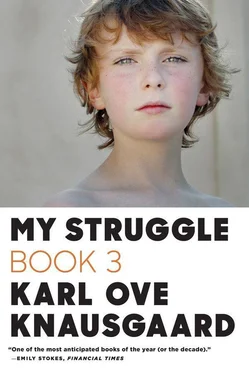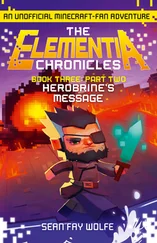“Hi!” she said.
“We thought you were ill,” I said.
“We’ve brought you the homework,” Geir said.
She was wearing a white sweater with a high neck and a red pattern, and blue trousers. The skin above her lips was as white as milk.
“Wouldn’t you like to go outside and play?” she said. “I’ve been indoors all day. And all day yesterday too!”
“Sure,” I said. “Is that all right, Geir?”
“Why not,” Geir said.
She put on her white boots and the red raincoat. Her mother went upstairs.
“See you, Mom!” she called and ran out. We ran after her.
“What should we do?” she said, stopping where the gravel finished and suddenly turning to us. “Want to go down to Solveig’s?”
We did. Solveig came out, Anne Lisbet suggested doing some skipping, so we stood there, Geir and I, with elastic around our legs while Solveig and Anne Lisbet hopped and skipped to and fro in accordance with the intricate patterns they mastered to such perfection. When it was my turn Anne Lisbet showed me what to do. She placed her hand on my shoulder and a quiver ran through me. Her dark eyes sparkled. She burst into laughter when I messed it up, and, oh, I smelled the fragrance of her hair as it flew past my face.
It was absolutely fantastic. Everything was absolutely fantastic. Above us the cloud thickened, the gray had taken on a tinge of bluish black, the sky was like a wall above the forest, soon afterward it began to rain. We put up the hoods on our rain jackets and continued to skip. The rain fell on our hoods and ran down our faces, the gravel crunched beneath our feet, the lamp on top of the pole at the end of the cul-de-sac suddenly came on. A little while later a car approached slowly.
“That’s Dad!” Anne Lisbet said.
The car, a Volvo Estate, stopped at the end of the drive, and a large, powerful man with a black beard stepped out. He waved to her, she ran over to him, he bent down and gave her a hug, then went in.
“We’re having dinner now,” she said. “What was for homework?”
I told her. She nodded, said bye, and was gone.
“I have to go, too,” Solveig said, standing there with her sad eyes and rolling up the elastic.
“Us, too,” I said.
When we reached the crossroads I suggested running all the way to the shop, which we did. There, Geir suggested we didn’t go home via Grevlingveien, nor through the forest, but take the main road down to Holtet. Which we did. A path led from there up through the heath to Ringveien, which we then followed home. But after we had gone a few meters along the road, something strange happened. The bus came down, instinctively I turned, and in the window, only a little way from me, at the same height, sat Yngve!
What on earth was he doing there? Was he going to Arendal? Now? What was he going to do there?
“That was Yngve,” I said. “He was on the bus.”
“Oh yes,” Geir said, not very interested. We crossed the lawn outside the house there and walked onto the road.
“That was really fun up there,” Geir said.
“Yes,” I said. “Shall we go up again later?”
“Yes,” Geir said. “But perhaps it’s best not to tell anyone? After all, they’re girls.”
“Well, there’s no reason why we should.”
From the top of the hill I could see that Dad’s car was parked outside our house. Geir’s father was home, too. They were teachers and finished work earlier than other fathers.
I recalled the garbage can I had used to get indoors.
“Shall we do something else?” I said. “Go somewhere else? Down to the tree swing?”
Geir shook his head.
“It’s raining. And I’m hungry. I’m going home.”
“OK,” I said. “Bye.”
“Bye,” Geir said, and ran to his house. He slammed the door so hard the glass rattled. I gazed across at Gustavsen’s house. There was a light on in the kitchen. Had they come back home or was it the father? They had a garage, so it was impossible to know whether the car was there or not.
I turned and looked up the hill. Marianne’s father took off the lid of the garbage can and threw in a scrunched-up plastic bag. He was wearing a woollen cardigan and was unshaven. He always looked angry, but I wasn’t sure if he was, I had never spoken to him or heard anything about him. He was a seaman and away for large parts of the year. When he was at home he was there all the time.
He closed the door without noticing me.
From the crossroads came an enormous yellow truck with rocks on the back. The ground vibrated as it passed. Thick smoke rose from an exhaust pipe at the front.
Yngve had once shown me a picture of the biggest vehicle in the world. It was in a book about the Apollo program he had borrowed from the library. Everything about it was the biggest in the world. It had been especially built to transport the rocket the few kilometers to the launch pad. But it was as slow as it was big and moved at a snail’s pace, Yngve said.
The most appealing part was the launch itself. I could look at photos of it any number of times. Once I had seen it on TV, too. You might expect the rocket to shoot off from the platform at an incredible speed, but that was not the case; on the contrary, for the first few meters it rose very slowly, the fire and the smoke it emitted formed a kind of cushion underneath, which it seemed to rest on for a brief instant before gently moving upward, almost waveringly, with a colossal roar that could be heard from a distance of several kilometers. And then it soared faster and faster until its speed was as mind-blowing as you had imagined, and it flew like an arrow or lightning into the crystal-blue sky.
Sometimes I imagined a rocket being launched from this forest. Hidden behind a mountain, it would be erected in secret and one day we would see it rise slowly, very slowly, above the trees just down there, pure and white against the green and gray, with a cloud of fire and smoke beneath it, and then it would be clear of them, almost hanging in the sky for a moment, before gaining speed and soaring faster and faster upward with the roar from the gigantic engines reverberating between our houses.
It was a good thought.
I jogged down to the house, crossed the gravel to the door, opened it, and was taking off my boots on the doormat when Dad came into the hall from his study.
I glanced up at him.
He didn’t look particularly angry.
“Where have you been?” he said.
“Playing with Geir,” I said.
“That wasn’t what I asked you,” he said. “ Where have you been?”
“We were up at B-Max,” I said. “Behind it.”
“Oh,” he said. “What were you boys doing there?”
“Nothing much,” I said. “Playing.”
“You’ll have to go back,” he said. “We need some potatoes. Can you buy some, do you think?”
“Yes,” I said.
He took his wallet from his rear pocket and produced a banknote.
“Let me see your pockets,” he said.
I stood up and thrust forward my hips.
He passed me the note.
“Put this in your pocket,” he said. “And don’t hang around.”
“OK,” I said. He went back to the kitchen. I put my boots back on, closed the door gently behind me, and set off at a run.
Yngve came home shortly before we were to have dinner and just made it to his bedroom before Dad shouted that the food was ready. He had fried some chops and onions and boiled some cauliflower and potatoes. Mom informed us that we were going to have a cleaning woman, an old lady called Fru Hjellen, who would come once a week, and she would be popping by this afternoon. Mom had rung her from work, she said, she had seemed very nice. I knew Dad didn’t want a cleaning woman, he had mentioned it once, but now he was quiet, so I supposed he must have changed his mind.
Читать дальше












